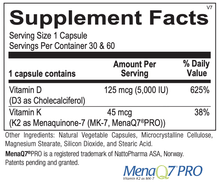- Description
- Benefits
- Supplement Facts
Clinical Applications
- Supports Healthy Blood Circulation
- Promotes Bone Health and Proper Calcium Storage
- Maintains Healthy Cardiometabolic Function and Supports Blood Sugar Balance Already Within Normal Levels
- Boosts Immune Function
New research is focusing on the synergistic relationship between vitamin K2 and vitamin D3, for bone and cardiovascular health. A group of naturally occurring and structurally similar, fat-soluble vitamins, vitamin K is essential for the proper utilization of calcium. Through its activation of the protein osteocalcin, vitamin K helps to bind newly absorbed calcium to the mineral matrix in bone. In addition, vitamin K has been found to help maintain bone mineral density by decreasing the activity of osteoclasts, a cell that breaks down the bone matrix. Vitamin K also provides critical cardiovascular protection by helping to activate matrix Gla protein (MGP), an inhibitor of circulatory calcification. Thus, vitamin K and vitamin D not only share similar qualities, but they also act synergistically within the body.
The addition of MenaQ7® PRO to this formula is backed by extensive research. Dr. Leon Schurgers, world-renowned expert in vitamin K2 as MK-7 research for cardiovascular and bone health, and his team of research scientists have conducted over 15 clinical trials on MenaQ7® PRO through the University of Maastricht.
Vitamin D3/K2 Capsules include 45 mcg of MenaQ7® PRO, the most widely studied form of vitamin K2 as MK-7, and 5,000 IU of vitamin D3 per capsule for optimal absorption and use by the body.
Suggested Use:
*These statements have not been evaluated by the Food and Drug Administration. This product is not intended to diagnose, treat, cure or prevent any disease.
Vitamin K Depletion
Although most people consume adequate dietary vitamin K to maintain sufficient blood clotting, most do not consume enough to meet cardiovascular and bone health needs. In fact, approximately 70% of the western population is deficient in vitamin K2.
Bone Health
Building and maintaining healthy bones requires a number of key nutrients including vitamin K, for the proper binding of calcium to the bone matrix.
Cardiovascular Health and Blood Sugar Balance
Vitamin K plays a key role in supporting the cardiovascular system as well as blood sugar balance already within normal levels.
Immune Modulation
New evidence also suggests vitamin K plays a central role in boosting immune function.
Triage Theory
The Triage Theory states that in the face of nutrient inadequacies, nature ensures short term survival of a cell is protected at the expense of long-term consequences.20,21Vitamin K is an excellent example of this theory. Hypothetically, a short term deficiency in vitamin K would lead to a reduction in blood clotting. This direct threat to survival does not happen, as the body uses its metabolic reserve of vitamin K to ensure immediate needs are met. If continued, this could begin to impact long-term reserves of vitamin K, reserves which are vital for the maintenance of proper bone strength and arterial elasticity. These issues are related to a loss of vitamin K-dependent proteins not required for short-term survival, nevertheless presenting long-term health challenges.

Sign up for weekly offers, news and advice
Plus 15% off your first order

Free shipping for all orders over $125
- Choosing a selection results in a full page refresh.
- Press the space key then arrow keys to make a selection.






